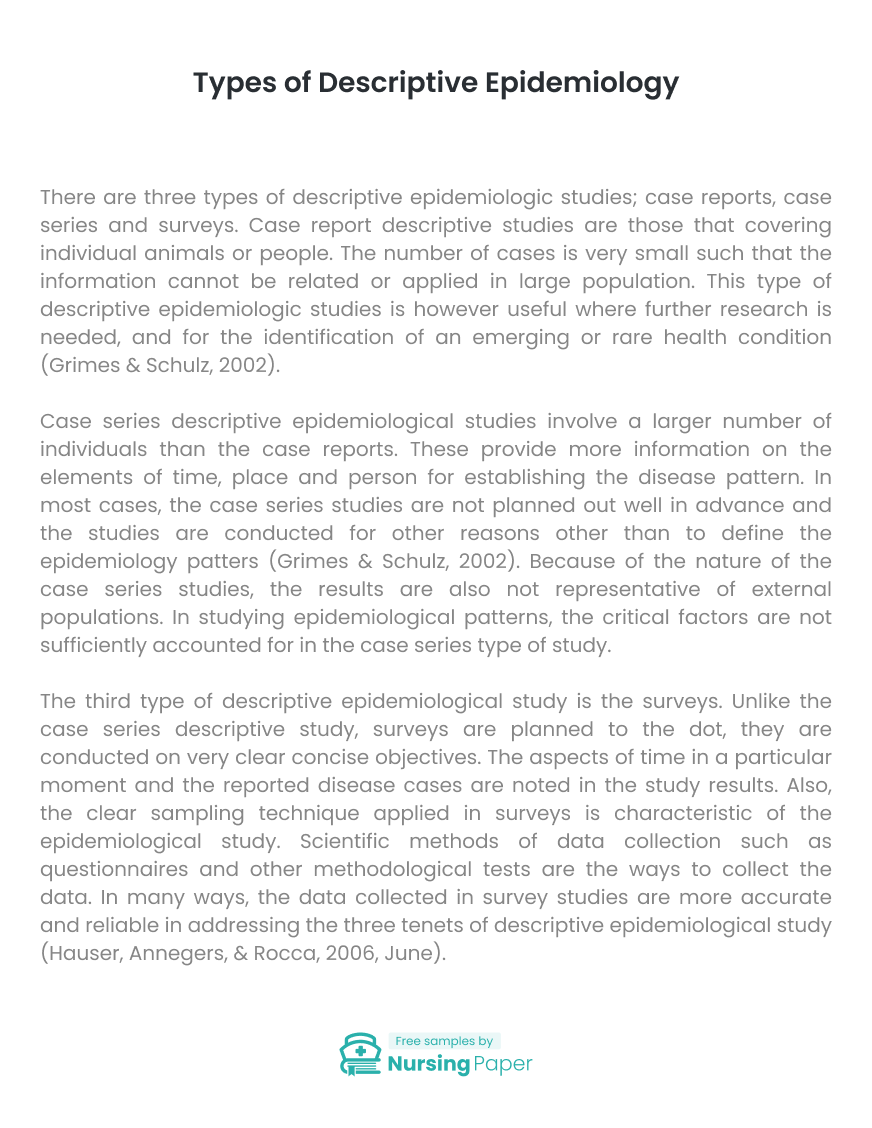
Types of Descriptive Epidemiology
Introduction
There are three types of descriptive epidemiologic studies; case reports, case series and surveys. Case report descriptive studies are those that covering individual animals or people. The number of cases is very small such that the information cannot be related or applied in large population. This type of descriptive epidemiologic studies is however useful where further research is needed, and for the identification of an emerging or rare health condition (Grimes & Schulz, 2002).
Case series descriptive epidemiological studies involve a larger number of individuals than the case reports. These provide more information on the elements of time, place and person for establishing the disease pattern. In most cases, the case series studies are not planned out well in advance and the studies are conducted for other reasons other than to define the epidemiology patters (Grimes & Schulz, 2002). Because of the nature of the case series studies, the results are also not representative of external populations. In studying epidemiological patterns, the critical factors are not sufficiently accounted for in the case series type of study.


The third type of descriptive epidemiological study is the surveys. Unlike the case series descriptive study, surveys are planned to the dot, they are conducted on very clear concise objectives. The aspects of time in a particular moment and the reported disease cases are noted in the study results. Also, the clear sampling technique applied in surveys is characteristic of the epidemiological study. Scientific methods of data collection such as questionnaires and other methodological tests are the ways to collect the data. In many ways, the data collected in survey studies are more accurate and reliable in addressing the three tenets of descriptive epidemiological study (Hauser, Annegers, & Rocca, 2006, June).
1. Grimes, D. A., & Schulz, K. F. (2002). Descriptive studies: what they can and cannot do. The Lancet, 359(9301), 145-149.
2. Hauser, W. A., Annegers, J. F., & Rocca, W. A. (2006, June). Descriptive epidemiology of epilepsy: contributions of population-based studies from Rochester, Minnesota. In Mayo Clinic Proceedings (Vol. 71, No. 6, pp. 576-586). Elsevier.



The download will start shortly.

The download will start shortly.
 Subject:
Health and Social Care
Subject:
Health and Social Care  Number of pages: 5
Number of pages: 5  Subject:
Medicine
Subject:
Medicine  Number of pages: 17
Number of pages: 17  Subject:
Health and Social Care
Subject:
Health and Social Care  Number of pages: 6
Number of pages: 6  Subject:
Health and Social Care
Subject:
Health and Social Care  Number of pages: 3
Number of pages: 3  Subject:
Nursing
Subject:
Nursing  Number of pages: 3
Number of pages: 3  Subject:
Health and Social Care
Subject:
Health and Social Care  Number of pages: 3
Number of pages: 3  Subject:
Health and Social Care
Subject:
Health and Social Care  Number of pages: 3
Number of pages: 3  Subject:
Nursing
Subject:
Nursing  Number of pages: 5
Number of pages: 5  Subject:
Medicine
Subject:
Medicine  Number of pages: 1
Number of pages: 1  Subject:
Health and Social Care
Subject:
Health and Social Care  Number of pages: 3
Number of pages: 3  Subject:
Nursing
Subject:
Nursing  Number of pages: 3
Number of pages: 3  Subject:
Medicine
Subject:
Medicine  Number of pages: 6
Number of pages: 6  Subject:
Medicine
Subject:
Medicine  Number of pages: 4
Number of pages: 4  Subject:
Health and Social Care
Subject:
Health and Social Care  Number of pages: 2
Number of pages: 2  Subject:
Health and Social Care
Subject:
Health and Social Care  Number of pages: 9
Number of pages: 9 
